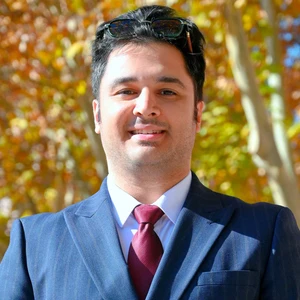
The Washington Summit Reshapes the Regional Order in the South Caucasus
 By Vasif HUSEYNOV, PhD, Head of Department, AIR Center, Adjunct Lecturer, ADA and Khazar Universities, Baku By Vasif HUSEYNOV, PhD, Head of Department, AIR Center, Adjunct Lecturer, ADA and Khazar Universities, Baku
President Donald Trump is right to describe the U.S.-mediated summit between the Armenian and Azerbaijani leaders on August 8 in Washington as a historic event. It is historic not only for its contribution to the peace process between the two countries, but also for the significant reshaping of the South Caucasus’ security order that it has set in motion. The day after the summit, the region woke up to a new reality – one markedly different from what had existed until recently. Undoubtedly, the most significant outcome of the Washington summit for the people of the South Caucasus was the agreements signed between Armenia and Azerbaijan. The two countries initialled the peace agreement, agreed to sign it following the removal of territorial claims against Azerbaijan from Armenia’s state constitution, jointly appealed for the dissolution of the Minsk Group of the OSCE, and agreed on the opening of the Zangezur corridor. READ MORE
- EGF Editor |
Published on EGF: 12.08.2025
| External Relations
-
Will Trump’s Tariffs Upend the India-US Relationship?  By Shanthie Mariet D’SOUZA, PhD, founder & president, Mantraya Institute for Strategic Studies (MISS) By Shanthie Mariet D’SOUZA, PhD, founder & president, Mantraya Institute for Strategic Studies (MISS)
New Delhi likely hopes that this phase of uncertainty is only temporary.
Shock and disappointment pervade policy circles in India following U.S. President Donald Trump’s decision to impose a 50 percent tariff on Indian exports to the United States. Although India has reacted cautiously with its “wait and watch” policy so far, it is expected that a more assertive response will emerge in the coming days and weeks. India and the United States have shared strong strategic ties for more than two decades. Despite highs and lows, the two countries have navigated their strategic partnership in the realm of security, space, trade, energy and technology. Trump’s tariff decision has the potential to derail a relationship built through years of negotiations and investment by both sides. READ MORE
- EGF Editor |
Published on EGF: 12.08.2025
| External Relations
-
U.S. policy in the South Caucasus: Keep Turkey in, Russia down and Iran out  By Yeghia TASHJIAN, Beirut-based regional analyst and researcher, columnist, "The Armenian Weekly” By Yeghia TASHJIAN, Beirut-based regional analyst and researcher, columnist, "The Armenian Weekly”
On August 8, Armenia’s Prime Minister Nikol Pashinyan, Azerbaijan’s President Ilham Aliyev and U.S. President Donald Trump endorsed a memorandum of understanding with seven points, affirming their commitment to finalize a peace agreement. At the same time, bilateral agreements were signed between the U.S. and each country separately. According to Narek Sukiasyan, a research fellow at the Center for Culture and Civilization Studies at Yerevan State University, the clauses in the memorandum carry considerable geopolitical weight. Most directly, they mandate the disbanding of the Organization for Security and Cooperation in Europe (OSCE) Minsk Group, which was co-chaired by the U.S., France and Russia to help resolve the Nagorno-Karabakh conflict peacefully. Baku has marginalized the group since 2020.
READ MORE
- EGF Editor |
Published on EGF: 12.08.2025
| External Relations
-
Strategic Implications of Russia–Ukraine Talks in Istanbul for Eurasia’s Diplomatic Rebalancing
 By Yunis GURBANOV, PhD, Senior Advisor at the AIR Center, Baku By Yunis GURBANOV, PhD, Senior Advisor at the AIR Center, Baku
The high-level encounter between Russian and Ukrainian representatives took place on 23 July 2025 in Istanbul. Turkey hosted the encounter with significant diplomatic weight, focusing on limited ceasefire corridors, the exchange of prisoners, and grain exports through the Black Sea. Though apparently narrow in scope, the gathering represents a rebalancing in wider geopolitics. Turkey's mediating role in Istanbul facilitates Ankara's renewed desire to be at the centre of regional diplomacy, particularly considering that Turkey has just hosted Russia-Ukraine direct negotiations in 2025 as a testament to its resumed mediating interests. On the other hand, Western leaders remained unimpressed by Moscow's long-term intentions, particularly in light of Russia's unyielding ultimatums in negotiations and ongoing military belligerency, calling into question its genuine interest in arriving at a settlement other than temporary tactical respite or concession. READ MORE
- EGF Editor |
Published on EGF: 12.08.2025
| External Relations
-
Israel War Erodes Iran’s Relations with Azerbaijan
 By Fuad Shahbazov, Baku-based independent regional security and defence analyst By Fuad Shahbazov, Baku-based independent regional security and defence analyst
The 12-day Israel-Iran war revealed new vulnerabilities in the Islamic Republic and increased tensions between Iran and its neighbour, Azerbaijan. In the aftermath of the strategic setback to Iranian nuclear and military facilities, Iran’s conservative political and security establishment began shifting focus toward perceived “close enemies” said to be complicit in the Israeli attacks. Among the primary targets of this narrative has been Iran’s northern neighbor, Azerbaijan, which Iranian state-run media and channels affiliated with the Islamic Revolutionary Guard Corps (IRGC) accused of providing “intelligence support to Israel” during the strikes on nuclear, military, and civilian sites. While Azerbaijani officials categorically denied any involvement in Israeli military operations and the Iranian government did not present concrete evidence supporting its claims, the media campaign renewed tensions between Tehran and Baku, undermining a period of cautious diplomatic stability that had followed earlier disputes over Armenia and other issues. Indeed, the Iranian criticism of a growing Azerbaijan-Israel alliance is not a new phenomenon and Azerbaijan’s ties with Israel have long been a source of discontent in Azerbaijan-Iran relations. READ MORE
- EGF Editor |
Published on EGF: 31.07.2025
| External Relations
-
Abu Dhabi Summit Reignites Progress on Zangezur Corridor  By Vusal GULIYEV, Policy Advisor at the Center of Analysis of International Relations and Head of Shanghai Office at AZEGLOB Consulting Group By Vusal GULIYEV, Policy Advisor at the Center of Analysis of International Relations and Head of Shanghai Office at AZEGLOB Consulting Group
The July 10 meeting in Abu Dhabi between Azerbaijani President Ilham Aliyev and Armenian Prime Minister Nikol Pashinyan has reinvigorated discussions on the long-sought Zangezur Corridor. Hosted by the United Arab Emirates as a neutral venue, the summit marked the first direct bilateral talks between the two leaders without mediators—a notable development given Russia’s traditional role in the South Caucasus peace process. While no final peace accord was signed, the talks were described as constructive, with extensive discussions on key sticking points, foremost among them the opening and development of the Zangezur Corridor. This 43-kilometer-long (around 26-mile-long) corridor—a proposed land route through Armenia’s Syunik province—is designed to link mainland Azerbaijan to its Nakhchivan exclave and then proceed onward to Türkiye. While short on immediate breakthroughs, the Abu Dhabi summit’s outcomes have nevertheless revived prospects for the corridor’s realization, notably by reaffirming a bilateral, results-oriented negotiation format and entertaining new ideas for its governance and security. READ MORE
- EGF Editor |
Published on EGF: 31.07.2025
| External Relations
-
The Limits of Pragmatic Intentions: The Evolving Story of China-India Rapprochement  By Shanthie Mariet D’SOUZA, PhD, founder & president, Mantraya Institute for Strategic Studies (MISS) By Shanthie Mariet D’SOUZA, PhD, founder & president, Mantraya Institute for Strategic Studies (MISS)
While the intention to reset China-India bilateral relations seems real, both the drivers and the outcomes need a careful analysis.
We live in a world of constant flux. Nations, over time, discover a variety of reasons – geopolitical or otherwise – to become friends or foes, based on their national interests. China-India relations aren’t immune from this truism. The trend in the past decade has seen the two neighbours embracing each other and then falling out. And after years of bickering and contestation, the time has come again for them to explore yet another round of engagement. Is the current rapprochement merely opportunistic and temporary? Or is it geared toward a long-term solution of their contestations driven by extraneous factors and geopolitical uncertainty?
On July 23, the 34th meeting of the Working Mechanism for Consultation and Coordination on China-India Border Affairs took place in New Delhi. The meeting discussed issues relating to strengthening border management and maintaining calm along their contested border. More concrete discussions on the “boundary question” are expected to be held when the special representatives of both countries meet for the 24th time later this year. READ MORE
- EGF Editor |
Published on EGF: 31.07.2025
| External Relations
-
Armenia and Azerbaijan have taken a new route in their quest for peace

 By Benyamin POGHOSYAN, PhD, Senior Research Fellow at the APRI Armenia
By Benyamin POGHOSYAN, PhD, Senior Research Fellow at the APRI Armenia
Lara SETRAKIAN, President, APRI Armenia
Political scientists and wider civil society from Armenia and Azerbaijan don’t often see eye to eye. After decades of war between the two countries their grievances run deep, with each side blaming the other for continued rounds of conflict. But experts in Yerevan and Baku can now agree on one thing: the meeting held in Abu Dhabi on July 10 between their heads of government was a moment of respite for the South Caucasus. After months without a major meeting between the two sides (the leaders met briefly at the margins of the European Political Community summit in Tirana in May), Abu Dhabi was able to host their most comprehensive gathering in known history, attended by representatives who cover all key aspects of the Armenia-Azerbaijan peace process. Still, expectations should be managed. The two sides may yet be very far from signing a peace agreement, though a draft was announced earlier this year. There are thorny issues, like border demarcation, that remain unresolved. And there are competing visions for how the future of transport links should evolve. Nonetheless, the Abu Dhabi meeting has revived the diplomatic track, giving new hope for peace and stability, while calming fears of an imminent outbreak of war.
READ MORE
- EGF Editor |
Published on EGF: 31.07.2025
| External Relations
-
Armenia-Azerbaijan Peace Process Gains Momentum with Abu Dhabi Summit
 By Vasif HUSEYNOV, PhD, Head of Department, AIR Center, Adjunct Lecturer, ADA and Khazar Universities, Baku By Vasif HUSEYNOV, PhD, Head of Department, AIR Center, Adjunct Lecturer, ADA and Khazar Universities, Baku
On July 10, Armenian Prime Minister Nikol Pashinyan and Azerbaijani President Ilham Aliyev met in Abu Dhabi, marking a historic milestone in their ongoing peace process. This summit, as the first bilateral meeting in recent decades without the mediation of a major power, signalled a new phase of direct dialogue between Baku and Yerevan, and followed a format of relations proposed by Baku in December 2024. Unlike previous talks held in EU capitals or Moscow, the United Arab Emirates provided a neutral and geopolitically unaligned platform, enhancing the credibility and focus of the negotiations. The choice of Abu Dhabi, proposed by Azerbaijan, underscored a push for strategic autonomy and a departure from stalled, externally brokered talks that have historically struggled to deliver results. READ MORE
- EGF Editor |
Published on EGF: 24.07.2025
| External Relations
-
Digitalization Strategies along the Middle Corridor: Transforming Trans-Eurasian Logistics  By Vusal GULIYEV, Policy Advisor at the Center of Analysis of International Relations and Head of Shanghai Office at AZEGLOB Consulting Group By Vusal GULIYEV, Policy Advisor at the Center of Analysis of International Relations and Head of Shanghai Office at AZEGLOB Consulting Group
With the Middle Corridor emerging as a secure and strategic land- and sea-based trade route, major stakeholders are making extensive efforts to develop the necessary infrastructure for further modernization and digitalization of such a complex multimodal trans-regional pathway. Nevertheless, government-led digital transformation strategies have enabled the political leadership of the involved states to implement advanced digital solutions, seamlessly integrating multiple services and optimizing cargo flows within the Sino-European trade network in a secure and intelligent manner. To meet international market demands and strengthen integration into the global transport network, the development of technologically advanced facilities has become a top priority in ensuring both the resilience and sustainability of the Middle Corridor. As geopolitical and economic dynamics continue to evolve dramatically, a strategic focus on digital transformation, automation, and intergovernmental coordination will become increasingly instrumental in positioning the Middle Corridor as a key pillar of trans-Eurasian trade, reinforcing its role as a secure, efficient, and future-ready trade and transportation corridor. READ MORE
- EGF Editor |
Published on EGF: 24.07.2025
| Markets
-
|
|
